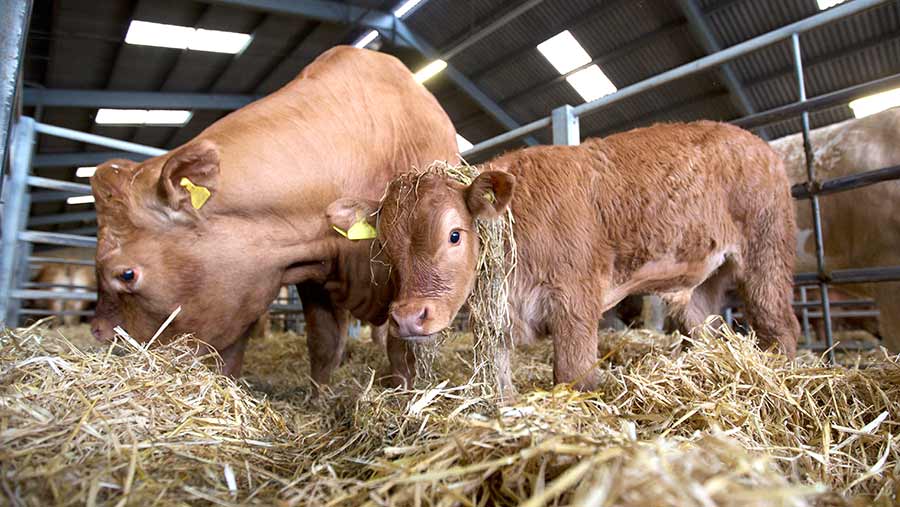Trial shows high iodine cow diet can hinder colostrum uptake
 © Tim Scrivener
© Tim Scrivener A survey of iodine supplementation in beef herds has revealed that over supplementation pre-calving can negatively affect calves’ ability to absorb colostrum.
A collaborative research project between Moredun Research Institute, animal nutrition company Norvite and Livestock Health Scotland took place on eight farms from Orkney to Lanarkshire in 2018.
Results showed that the farm with the highest level of iodine given to cows saw the lowest level of colostrum uptake in calves.
Whereas, the lowest iodine farm had the highest level of colostrum uptake and was the only farm to have no calves with failure of passive transfer (FPT) of colostral antibodies.
See also: Advice on feeding suckler cows at different stages of production
This highlights the need for beef farms to carry out forage analysis before carefully planning mineral supplementation, said researchers.
The researchers concluded that if neonatal calf disease is a problem in the herd, producers should ask their vet to check antibody absorption in calves under a week old and carry out forage analysis and mineral budgeting ahead of next calving season.
The research
Across the eight Scottish farms involved in the pilot trial, iodine intake was measured and the colostrum uptake of 70 calves was assessed.
Colostrum absorption was estimated using zinc sulphate turbidity (ZST). In ZST results, the number represents a different level of passive transfer status:
- 5 or below = complete failure of passive transfer
- 6-19 = partial failure of passive transfer
- 20 and above = adequate passive transfer
Results
Across the eight farms, iodine intake varied from 7.1mg to 134.5mg per head per day. The highest rate exceeds the legal limit of 10mg per kg dry matter.
The ZST readings from the calves showed:
- 13% of calves had complete failure of passive transfer
- only 34% of calves had adequate passive transfer of colostral antibodies
Zinc sulphate turbidity readings |
||
|
ZST level |
Colostrum uptake (passive transfer status) |
% of calves (n=70) |
|
<5 |
Complete failure |
13 |
|
6-19 |
Partial failure |
53 |
|
20+ |
Adequate |
34 |
The highest iodine farm had the lowest mean ZST and a history of neonatal calf disease (cryptosporidiosis). And the lowest iodine farm had the highest mean ZST and no calves with failure of passive transfer.
“A point worth noting is that the farms that volunteered to take part in this project were all very well-managed units, showing great attention to detail and working with their vets to optimise calf health,” said Beth Wells, research scientist from Moredun Research Institute.
“Also, as part of the project, calves born to heifers were excluded as they tend to have lower colostrum quality, as were twin calves as they tend to receive lower quantities of colostrum and not as quickly as singles.
“It was, therefore, unexpected to find so many calves with FPT and a real concern as this means that effectively, these calves have very little capacity to fight disease in the first few weeks of life.”
Iodine requirements
Iodine is an important trace element for cow metabolism and unborn calf development and growth. A deficiency can result in still-born or weak newborn calves as well as retained afterbirths.
Typical and recommended levels of iodine |
|||
|
Typical levels in pasture (mg/kg DM/ |
Typical average level in UK pastures (mg/kg DM) |
Recommended minimum levels in pasture to prevent deficiency (mg/kg DM) |
Recommended levels in the total diet (mg/kg DM) |
|
0.1-0.5 |
0.15 |
0.2*/0.5** |
0.5 |
Key: * for growing and dry stock ** for pregnant and lactating stock
Source: AHDB Better Returns Programme
Calf crop 2019: Maximising your live calves workshops
Upcoming workshops being run by SAC Consulting, Edinburgh and Glasgow Vet Schools in partnership with Norvite and Moredun are taking place on:
- Thursday 28 February: Carfraemill, Lauder, TD2 6RA
- Tuesday 5 March: Stirling Agricultural Centre, Stirling, FK9 4RN
- All welcome and workshops will be held from 10.30-14.30 with lunch provided and plenty of time for discussion.
